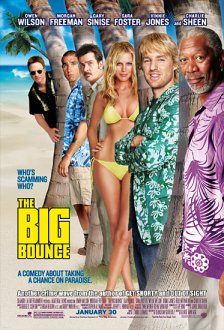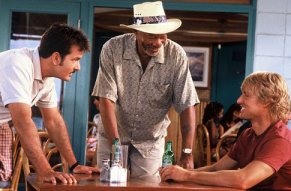|
The Big
Bounce
Elmore
Leonard's novels tend to meander without losing their cool.
Plots just sort of happen to complex characters that we often
can't help but like despite their various moral shortcomings.
The same thing might be said for Owen Wilson, an actor whose
persona relies upon a relaxed semi-stoner charm; most characters
he plays end up more surprised than anyone when things happen
to them.
And so
the perfect state to combine these elements should be Hawaii,
where everybody surfs, at least in movies, and life moves
at a more leisurely pace. You'd think so, wouldn't you?
Well,
you and everyone involved in The Big Bounce would be
wrong. A lackadaisical heist film that barely remembers that
it has somewhere to go, this movie overloads the meandering
so much that the only thing really stolen is the audience's
time.
Wilson
stars as Jack Ryan, considerably less stolid than Tom Clancy's
hero. Willing to do the wrong thing just as much as the right
thing, Ryan starts the movie off by clocking Vinnie Jones
with a baseball bat. The action makes him a hero among local
Hawaiian natives, because Jones' Mr. Harris is foreman on
a hotel construction project that violates sacred grounds.
But let's face it: Ryan swung the bat because he wanted to
hit something, not out of any sense of justice.
With
his good-natured affability, though, Ryan makes as many friends
as he does enemies. Soon enough, he's out of jail and into
a job as a handyman for a cluster of bungalows on an island
shore. On the side he still does some breaking and entering,
either for fun or just to impress local bad girl Nancy (Sara
Foster). It might be charming if it weren't for the strangeness
of his new employer, Judge Walter Crewes (Morgan Freeman)
obviously and purposefully looking the other way.
What
sort of set-up is this? By the time the twists start turning,
it has become impossible to care. To the film's detriment,
director George Armitage has gotten so caught up in the charming
possibilities of his surroundings that he can't seem to bring
them to fruition.
First
off is the strange presence and non-presence of the locale.
Nothing about being set in Hawaii really has anything to do
with the plot, except for the native protesters that are pretty
quickly forgotten. In fact, the controversy over this luxury
hotel site only gets mentioned a couple of times after the
set-up; the real con revolves around what a private jerk developer
Ray Ritchie (Gary Sinise) is. Oh, they try to make it about
business, but it's really about displeasure.
Worse,
Armitage uses the scenery only slightly less ham-handedly
than the infamous Brady Bunch in Hawaii episodes. Whenever
come dangerously close to making sense, the director cuts
away to surfing shots, just to remind us that hey, we're in
Hawaii. But he doesn't have the courtesy of at least throwing
in a cursed tiki idol.
 |
So perhaps
the charm of the performances could save it. In some moments,
it looks entirely possible. Wilson, of course, could read
the phone book and with his idiosyncratic delivery get a fair
share of laughs. He's bolstered by the always believable Freeman
and a raft of strong character actors, including a strangely
underplayed Charlie Sheen. But Wilson generates no chemistry
with the supposedly dangerous Nancy, nor with any other character
that he's supposedly enamored of. Probably, it's because we
just can't believe that Ryan has enough ambition to actually
pursue anybody, let alone connect with them on a meaningful
level. (Actually, he has some dialogue pretty much summing
that up.)
It's
also quite possible that nobody could connect with Nancy.
In her big-screen debut, Sara Foster smirks, winks and when
appropriate acts aloof to bend men to her will. Presumably,
these same gestures are what led to her casting, because she
cannot act. Smoking hot, the film gets noticeably less interesting
when Armitage puts her in scenes with clothing. Nancy ends
up being not so much femme fatale as femme futile, and so,
who cares?
We should.
But we don't.
Rating:

|








